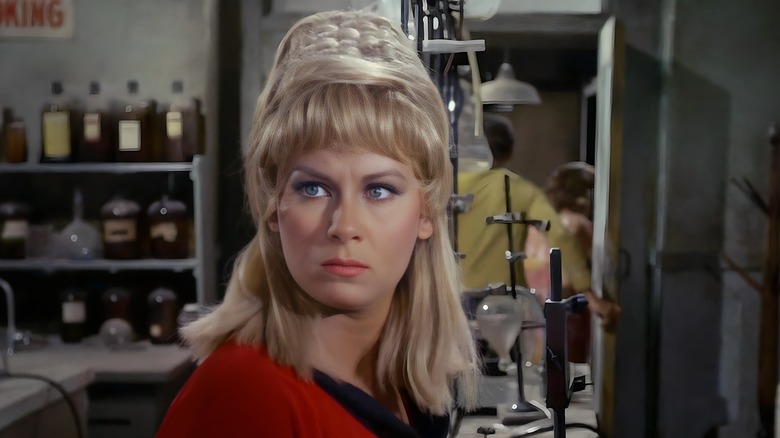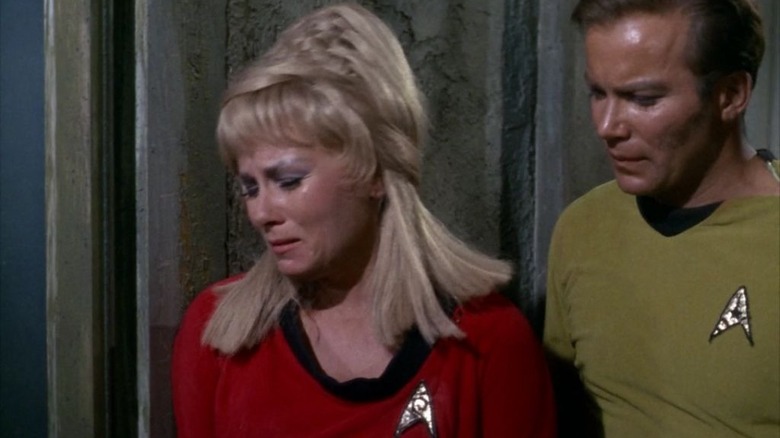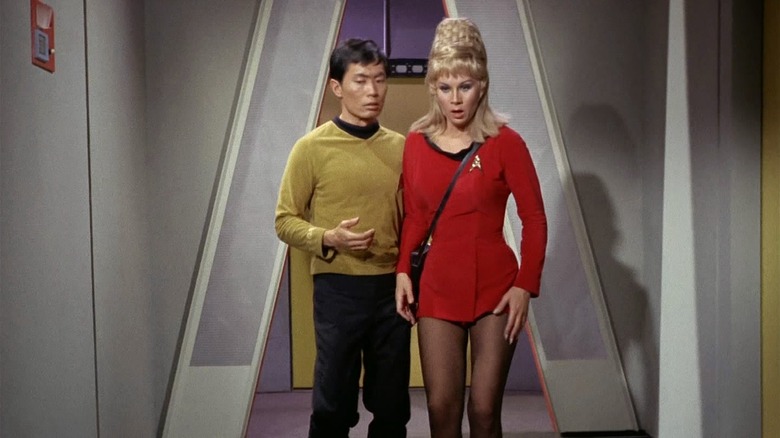Star Trek's Gene Roddenberry Always Regretted Cutting One Character From The Show
There is no in-universe explanation for the disappearance of Yeoman Janice Rand (Grace Lee Whitney), an enlisted officer often seen on the bridge of on the U.S.S. Enterprise. Yeoman Rand appeared in eight episodes of the original "Star Trek" series, usually sporting an elaborate beehive hairdo. The story goes (told in Herbert Solow's 1997 book, "Inside Star Trek: The Real Story") that Whitney was cast in "Star Trek" because she had worked with show creator Gene Roddenberry on an unsold pilot called "Police Story." Rand was a resolute but emotionally vulnerable character who often provided distress or confusion in a scene to communicate seriousness to the audience. Yeoman Rand didn't have a rank (naval yeomen merely perform clerical duties), putting her outside of the ultra-professional auspices of Starfleet formality. Her reactions to extreme scenarios, then, were allowed to be more natural and organic.
Why did Yeoman Rand disappear from the show? Years later, Whitney would reveal that she left "Star Trek" after being sexually assaulted by an executive on the series that she only, throughout her life, called "The Executive." In her 1998 memoir, "The Longest Trek: My Tour of the Galaxy," Whitney recalls the harrowing details of her assault and how she gladly abandoned "Star Trek" the moment she thought to flee the room. After leaving the show, Whitney recalled receiving support from co-star Leonard Nimoy. It was a very hard time in her life, and she subsequently struggled with alcoholism. She eventually recovered and lived to the age of 85.
It seems no one wanted Yeoman Rand off of "Star Trek," least of all Roddenberry. In the oral history "The Fifty-Year Mission: The Complete, Uncensored, Unauthorized Oral History of Star Trek: The First 25 Years," Whitney and Roddenberry recall the legacy of the character.
Strength and guts
Grace Lee Whitney played Rand as a brave character, often in situations beyond her control but facing them with aplomb. She was a supporting player in the best sense, offering her presence as a definitive counterbalance to the other characters. If Kirk (William Shatner) was steely, then Rand was human — yelling, crying, or getting furious. In only eight appearances, Whitney defined the character remarkably well. The actor commented years later in "The Fifty-Year Mission" on why she liked Yeoman Rand, why she had so many fans, and why she felt cheated:
"Rand had a lot of strength and a lot of guts. I think her character could have been further developed. Rand was on the same card of credits as McCoy in the beginning. She was to be the major female character. All the early publicity shots were with Bill, Leonard, and me in the middle. The thing about this business is that you have to survive no matter what they do to you. Taking her out of the show has made Rand somewhat of an underdog and the fans have always rallied behind her all this time. I feel cheated."
Whitney recalled that she was originally contracted to appear in 13 episodes but wasn't able to fulfill her contract after her harrowing experience backstage. She did recall, however, the scene she shot that made her realize she was going to be fired — fired before she could call out The Executive — and what she threw into her performance. Her final episode aired on December 8, 1966. Whitney said:
"I remember one time in the episode 'Conscience of the King,' I just walked across and handed Shatner a clipboard and winked and walked away. But there was no dialogue. I knew at that time that I had been let go."
The reasons why
At the time Grace Lee Whitney was interviewed for "The Fifty-Year Mission," it seems that she hadn't made the news of her assault public yet. The studio gave her various reasons for why Yeoman Rand was excised from the show, but they now feel like excuses after the fact. Whitney shared the reasons, however, and they sound unfair regardless. Whitney said:
"I was let go because of several reasons. The main reason was that they told me they wanted Captain Kirk to have more female friends. They felt Rand and Kirk were getting too close and they didn't want that. They were going to write Scotty out, too, but decided to keep him. They even had a clause in Leonard [Nimoy's] contract that said if his ears didn't go over they could get rid of him."
Gene Roddenberry himself also recalled some of the studio mandates, and he said that he was required to shrink Yeoman Rand's role on "Star Trek" because the executives wanted Kirk to have multiple love interests and not mere romantic tension with one of his fellow crewmates. Roddenberry said:
"The mistake I made with Rand, and I've regretted it many times, was the network said to me, 'We've been meeting on this and we think what you should do is get a different, exciting young lady every week, rather than the same one.' And I had said 'no' so many times to the network that I thought I maybe should give them a 'yes' this time. But looking back now, I would've kept Rand on the show and I'm sorry I didn't. I know what a disappointment it was to Grace Lee Whitney ..."
Whitney returned for the first, fourth, and sixth "Star Trek" movies. She cemented her legacy.


